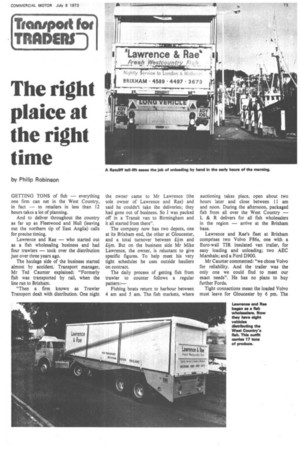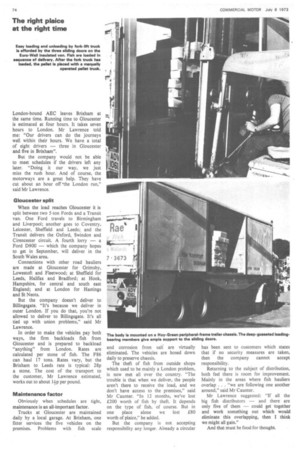The right plaice at the right time
Page 75

Page 76

If you've noticed an error in this article please click here to report it so we can fix it.
by Philip Robinson GETTING TONS of fish — everything one firm can net in the West Country, in fact — to retailers in less than 12 hours takes a lot of planning.
And to deliver throughout the country as far up as Fleetwood and Hull (leaving out the northern tip of East Anglia) calls for precise timing.
Lawrence and Rae — who started out as a fish wholesaling business and had four trawlers — took over the distribution just over three years ago.
The haulage side of the business started almost by accident. Transport manager, Mr Ted Caunter explained: "Formerly fish was transported by rail, when the line ran to Brixham.
"Then a firm known as Trawler Transport dealt with distribution. One night the owner came to Mr Lawrence (the sole owner of Lawrence and Rae) and said he couldn't take the deliveries; they had gone out of business. So I was packed off in a Transit van to Birmingham and it all started from there".
The company now has two depots, one at its Brixham end, the other at Gloucester, and a total turnover between and Lim. But on the business side Mr Mike Lawrence, the owner, is reluctant to give specific figures. To help meet his very tight schedules he uses outside hauliers on contract.
The daily process of getting fish from trawler to counter follows a regular pattern:—
Fishing boats return to harbour between 4 am and 5 am. The fish markets, where auctioning takes place, open about two hours later and close between 11 am and noon. During the afternoon, packaged fish from all over the West Country — L & R delivers for all fish wholesalers in the region — arrive at the Brixham base.
Lawrence and Rae's fleet at Brixham comprises two Volvo F86s, one with a Euro-wall TIR insulated van trailer, for easy loading and unloading; two AEC Marshals; and a Ford D900.
Mr Caunter commented: "we chose Volvo for reliability. And the trailer was the only one we could find to meet our exact needs". He has no plans to buy further Fords.
Tight connections mean the loaded Volvo must leave for Gloucester by 6 pm. The London-bound AEC leaves Brixham at the same time. Running time to Gloucester is estimated at four hours. It takes seven hours to London. Mr Lawrence told me: "Our drivers can do the journeys well within their hours. We have a total of eight drivers — three in Gloucester and five in Brixham".
But the company would not be able to meet schedules if the drivers left any later. "Doing it our way, we just miss the rush hour. And of course, the motorways are a great help. They have cut about an hour off 'the London run," said Mr Lawrence.
Gloucester split When the load reaches Gloucester it is split between two 5-ton Fords and a Transit van. One Ford travels to Birmingham and Liverpool; another goes to Coventry, Leicester, Sheffield and Leeds; and the Transit delivers the Oxford, Swindon and Cirencester circuit. A fourth lorry — a Ford D900 — which the company hopes to get in September, will deliver in the South Wales area.
Connections with other road hauliers are made at Gloucester for Grimsby, Lowestoft and Fleetwood; at Sheffield for Leeds, Halifax and Bradford; at Hook, Hampshire, for central and south east England; and at London for Hastings and St Neots.
But the company doesn't deliver to Billingsgate, "It's because we deliver in outer London. If you do that, you're not allowed to deliver to Billingsgate. It's all tied up with union problems," said Mr Lawrence.
In order to make the vehicles pay both ways, the firm backloads fish from Gloucester and is prepared to backload "anything" from London. Rates are calculated per stone of fish. The F86 can haul 17 tons. Rates vary, but the Brixham to Leeds rate is typical: 28p a stone. The cost of the transport to the customer, Mr Lawrence estimated, works out to about Lip per pound.
Maintenance factor Obviously when schedules are tight, maintenance is an all-important factor.
Trucks at Gloucester are maintained daily by a local garage. At Brixham, one fitter services the five vehicles on the premises. Problems with fish scale and corrosion from salt are virtually eliminated. The vehicles are hosed down daily to preserve chassis.
The theft of fish from outside shops which used to be mainly a London problem, is now met all over the country. "The trouble is that when we deliver, the people aren't there to receive the load, and we don't have access to the premises," said Mr Caunter, "In 12 months, we've lost £200 worth of fish by theft. It depends on the type of fish, of course. But in one place alone we lost 00 worth of plaice," he added.
But the company is not accepting responsibility any longer. Already a circular has been sent to customers which states that if no security measures are taken, then the company cannot accept responsibility.
Returning to the subject of distribution, both feel there is room for improvement. Mainly in the areas where fish hauliers overlap . "we are following one another around," said Mr Caunter.
Mr Lawrence suggested: "If all the big fish distributors — and there are only five of them — could get together and work something out which would eliminate this overlapping, then I think we might all gain."
And that must be food for thought.




























































































































































